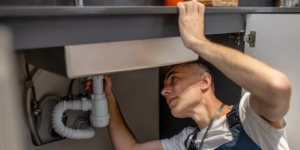Grease Trap Perth needs to be properly maintained. If not, they can cause clogs that lead to FOG-related sewer overflows, which can pollute rivers, lakes, and oceans.
Physicochemical characterization results show that kitchen wastewater separates into three layers inside grease traps: floated scum, suspended solid-liquid wastewater, and settled sludge. These characterizations suggest that several mechanisms are responsible for scum formation, separation, and accumulation inside grease traps.

A grease trap is an essential piece of equipment required by law in many cities. Its purpose is to separate fats, oils, and grease (FOG) from wastewater so that it can be sent to the city sewer system. With proper maintenance, the trap can become clogged and prevent sewage backups. To avoid these problems, it is important to schedule regular cleanings and inspections of the grease trap.
When it enters waterways, FOG can also harm the environment. It forms a thick layer on the surface of the water, which prevents sunlight from reaching the aquatic ecosystem and can reduce oxygen levels. This can lead to the death of aquatic plants and animals. In addition, the FOG can contaminate soil and seep into groundwater, which can be toxic to humans.
To maintain your grease trap, keep it clean by using a chemical solution to dissolve the remaining grease and residue. Follow the manufacturer’s instructions for the dosage and allow the solution to sit for the recommended amount of time before rinsing. It is important to remove the lid of the trap slowly and carefully so that you do not damage the gaskets. After removing the bulk of the waste, place it in a bucket or heavy-duty trash bag for disposal.
Another way to protect the environment is to use best practices in your kitchen to minimize the amount of FOG that enters the grease trap. These include scraping food scraps into the trash before washing dishes and using strainers in sinks and floor drains to catch solid debris. It is also important to wash greasy plates and cooking utensils with cold water, as hot water can cause the grease to harden and block the drain.
A dirty grease trap can also attract pests like cockroaches and rats, which can contaminate food and spread diseases. It can also emit pungent odors that can irritate customers and affect business. These odors can also cause headaches and nausea in employees. To mitigate these risks, you should schedule regular grease trap cleanings and inspections every one to three months.
Health
Grease traps can produce unpleasant odors and fumes if they are not cleaned regularly. These fumes can also cause irritation to the eyes and respiratory system in some people. However, they are not harmful at low concentrations. The odors can be minimized by enclosing the grease trap in a well-ventilated area and using odor control products. Keeping your grease trap clean can help reduce the risk of health problems and ensure that your customers have a positive experience in your restaurant.
Regular grease trap maintenance is essential to prevent clogs, overflows, and blockages in the sewer system. Food businesses are required by law to keep records of their grease trap cleaning and disposal schedules. These records can be used to determine compliance during inspections. In addition, proper grease trap installation and sizing can help minimize environmental impact.
Sewer clogs and backups can be a major source of pollution in the environment. When FOG and other wastes overflow into the sewer, they can pollute water bodies and harm ecosystems. In the water, FOG can cling to plants and animals and deplete oxygen levels. This can result in water contamination, soil degradation, and habitat destruction.
Insufficient maintenance of grease traps can lead to the accumulation of flammable materials, which can trigger fires. The resulting fires can be difficult to control and can destroy your entire kitchen, as well as your building’s structure. The flammable material can also cause toxic smoke and fumes, which can irritate the eyes and respiratory systems of employees and customers.
FOG is one of the leading causes of sanitary sewer overflows. The resulting spills can contaminate streets, sidewalks, parking lots, and homes. Fortunately, FOG can be prevented by requiring every food service business to have a properly installed grease trap and implementing regular cleaning and maintenance schedules.
The environmental benefits of a grease trap include reduced energy costs, lower operating costs, and a reduction in the amount of wastewater that is sent to the sewage treatment plant. Moreover, it can also prevent the discharge of raw sewage into waterways and reduce air pollution.
Environment
Grease traps are an indispensable part of any restaurant kitchen, serving as frontline defenses against FOG-related drainage issues and environmental pollution. They collect and separate fats, oils, and grease from wastewater streams while preventing them from reaching the municipal sewer system. However, if these traps are not properly cleaned and pumped out, they can become clogged and cause wastewater backups and overflows. In addition, neglecting to clean a grease trap can void its warranty and lead to costly repair or replacement costs.
Moreover, FOG-contaminated wastewater can have far-reaching effects on the environment. FOG clings to shorelines and vegetation, interfering with natural ecosystem balance and damaging biodiversity. It also contaminates the water by reducing oxygen levels and suffocating aquatic plants and animals. Furthermore, contaminated wastewater can interfere with municipal wastewater treatment plant operations and contaminate POTW sewage sludge.
In order to avoid these negative impacts, restaurants must ensure their grease traps are properly maintained and inspected on a regular basis. This can be achieved by partnering with a company that designs, installs and services high-quality grease traps. By doing so, businesses can prevent costly problems in the future and maintain compliance with local environmental regulations.
Additionally, businesses should implement waste minimization strategies to reduce the amount of FOG and food waste that enters their grease trap systems. This can be achieved by educating staff on proper waste disposal practices, using strainers in sinks and floor drains to catch solid waste, and utilizing grease traps with larger capacities.
Finally, businesses should also consider implementing biodigesters to maximize resource recovery and improve environmental sustainability. These devices convert organic waste into gas and digestate, which can be used as a renewable energy source and as a substitute for landfills. In addition, they can reduce the volume of waste that reaches sewage treatment plants, thereby easing the burden on existing infrastructure and improving operational efficiency. This is particularly important in areas with limited or aging sewer systems.
Cost
The cost of installing and maintaining a grease trap can be high, but it is well worth the investment to protect your restaurant and avoid costly drain repairs. Moreover, it helps you stay in compliance with city health codes and avoids the hassle of fines and penalties.
FOG is one of the main causes of sewer blockages and overflows. These clogs release raw sewage into neighborhoods, businesses, and streets, posing a public health hazard. Grease traps can help prevent clogs and overflows by collecting and containing FOG before it enters the sanitary sewer system.
A high-quality grease trap should have a stainless steel tank with baffle walls that allow for better separation of FOG from wastewater. It should also have a manhole cover and outlet fitting that are solid steel and not made of cement. It is important to clean and maintain your grease trap regularly to keep it operating efficiently and reduce maintenance costs.
If you neglect to clean your grease trap, it will soon become clogged with fats, oils, and grease (FOG). FOG can damage the lining of the pipe, causing a sewage backup and potentially costing you thousands of dollars in damages and repair costs. In addition, the rotting food waste inside your grease trap can produce toxic hydrogen sulfide gas that attacks mild steel and concrete materials.
Besides being expensive, FOG can also contribute to global warming and other environmental issues. When deposited in landfills, FOG decomposes and releases methane, which is a greenhouse gas that contributes to climate change. A commercial grease trap can reduce the amount of methane that is released into the environment by keeping it from entering the sewer system and landfills.
The average cost of a large grease trap is about $1000, and installation can add another $500 to $2000. You may also need to pay for permit fees, inspections, and other associated expenses. However, these costs are small compared to the fines you’ll face if you don’t have a working grease trap. A professional can help you choose the right grease trap for your business, install it, and maintain it.
